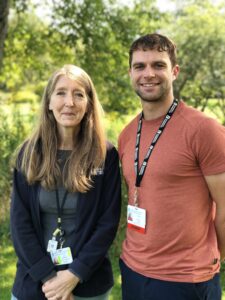At the Northeast Center, we are deeply committed to evolving with the changing needs of the communities we serve. Recently, we have become increasingly concerned about the rising levels of stress and mental health challenges among agricultural populations, especially in light of the rapidly shifting agricultural landscape.
While stress has always been an inherent part of farming—whether due to fluctuating stock prices, unpredictable weather, animal health issues, machinery breakdowns, or long working hours at peak times—our interactions with farmers reveal that they are now facing unexpected and, in many cases, unprecedented challenges.
A 2020 report by the USDA highlights a dramatic shift in the dairy industry.∗ In 1987, the median herd size was 80 cows or fewer, but by 2017, that number had skyrocketed to 1,300 cows. The pace of consolidation in the dairy sector has far outstripped other areas of U.S. agriculture, with production increasingly shifting to large-scale operations. The decline of small dairy farms is being felt most acutely in four key states: Minnesota, New York, Pennsylvania, and Wisconsin. In these states, the number of farms with at least 1,000 cows nearly doubled between 2007 and 2017. This expansion has come at the expense of small to medium-sized family farms (10-199 cows), which saw their numbers fall by more than a third during this period.
Anecdotally, the pressures on small and medium-sized dairy farms are more than just economic. They affect the mental health of individual farmers, their families, and the broader vitality of rural communities.

We believe that to truly support farmers in achieving better mental health outcomes, we need to take a comprehensive approach that considers the broader context in which they live and work. To this end, Dr. Conor Hammersley has recently joined our team and will embark on research to (1) explore the lived experience of agricultural change and its impact on mental health, farm-family life, and the fabric of rural communities; (2) adapt mental health support programs to reflect what we’ve learned; and (3) inform policymakers on our results in order to shape supportive policy.
We believe that by paying closer attention to farmer mental health at the intersection of change, identity, and livelihood, and by framing interventions that account for the wider contextual factors that make farmers particularly vulnerable to poor mental health, only then can we fully support farmers to achieve better mental health outcomes.
∗ MacDonald JM, Law J, Mosheim R. Consolidation in U.S. Dairy Farming. Washington DC: United States Department of Agriculture. 2020


